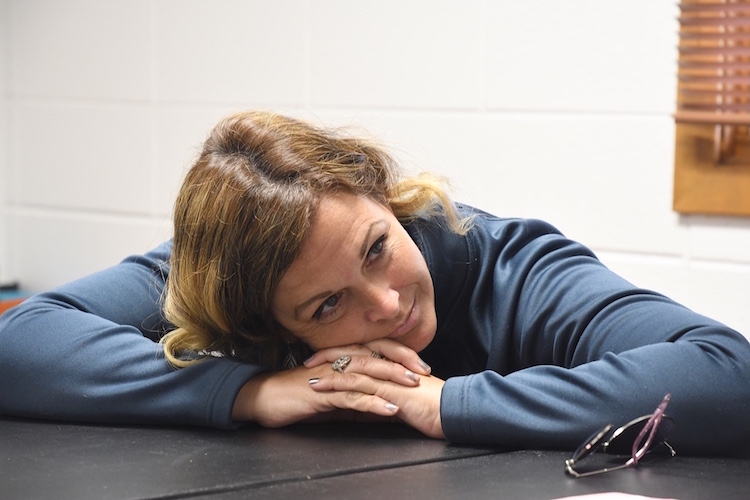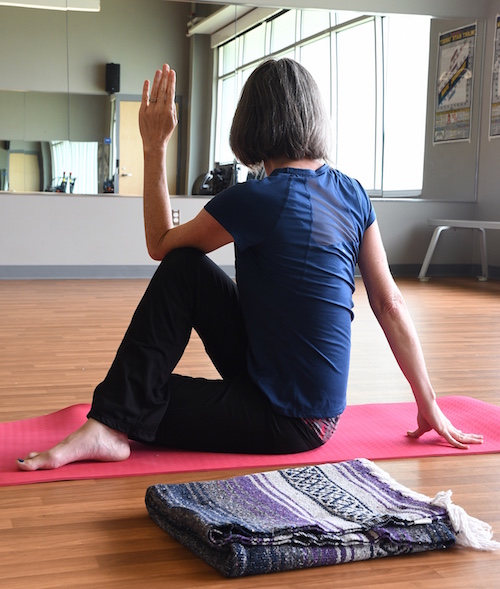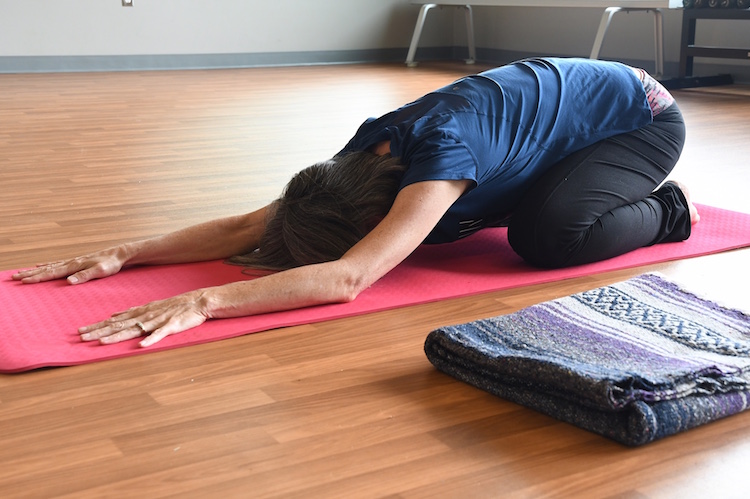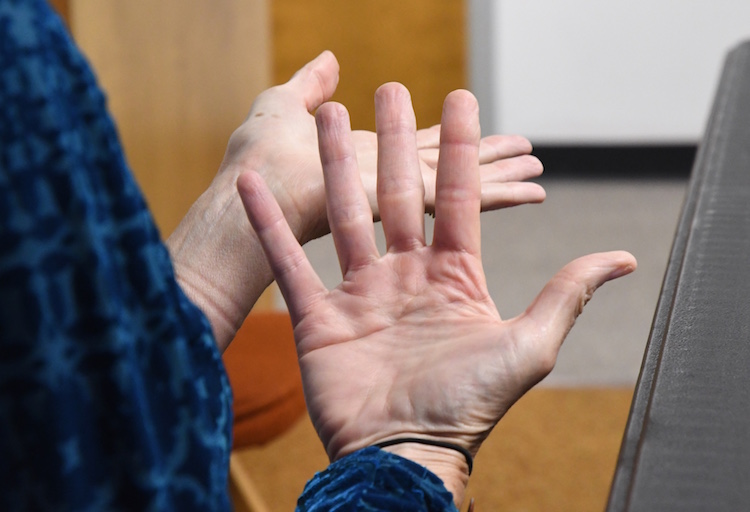There’s more than one way to do AA. New group in Old Lakeview adds a yoga practice
Here's a neighborhood spot in Battle Creek's Old Lakeview where there is help and hope for those who want to be sober.
Editor’s note: This story is part of Southwest Michigan Second Wave’s On the Ground Battle Creek series.
The combination of regular attendance at Alcoholics Anonymous meetings and yoga practices has helped Cindy A. cope with her addiction to alcohol and kept her sober for eight years.
Cindy, who asked that her last name not be used, says she thought that others who had an addiction or dependency issues could derive the same benefits yoga has given her, so she began leading yoga classes at the Trinity Neighborhood Center. Pastor Janet Wilson, who is in charge of the Trinity site, gave her blessing to use a room for the classes, which are free to anyone who wants to join in.
The classes are, “pretty small, usually between two and five people,” Cindy says. “We’d like it to grow so we could move into a bigger room. It’s for anyone who has an addiction or dealing with a family member or friend who has an addiction or anyone interested in learning more about it.”
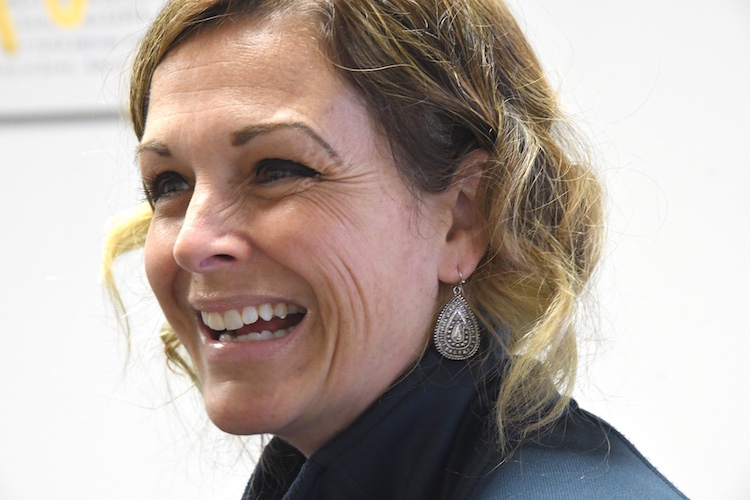
Cindy’s classes are modeled on the Yoga of 12-Step Recovery – Y12SR – an addiction relapse prevention program that integrates the wisdom of yoga and the practical tools of 12-Step recovery programs. Guided by its theme “The Issues Live in the Tissues,” Y12SR meetings are offered throughout the United States and overseas and are fast-becoming a feature of addiction recovery treatment centers.
“Y12SR says yoga isn’t a replacement for any type of recovery program, it’s an additional resource,” Cindy says.
For Meredith Wright, a dental hygienist who works for a dental practice in Battle Creek, having that additional resource is a critical part of her recovery process from alcoholism. Wright said she comes from a family with significant alcohol and substance abuse issues.
“My mother was in Alcoholics Anonymous. My family members are either dead or in Alcoholics Anonymous,” she says. Wright’s mother passed away two years ago. “I had two cousins who overdosed on heroin. Of my mom’s nine siblings, they’re either dead or in recovery and you can trace that back to alcohol. I am the oldest of 22 cousins who all had addiction issues or were in denial.”
Now, 500 days sober, Wright says her family members say she is a miracle because she was able to survive and is now focused on fixing a trail of wreckage caused by her drinking. She attends AA meetings six days a week and the yoga classes which are now being held on the first Saturday of every month. (Cindy eliminated her every other Tuesday class for the summer.)
Wright learned about the Y12SR classes from an aunt.
Wright was animated and had a difficult time sitting still in the room where the classes take place as she described how yoga has helped her cope with a disease that took hold of her as a college student, tending bar to pay her way through school. She says she knew when she had her first drink in 1990 that it wasn’t good for her.
Wright says since then, “I never knew a time without alcohol. I didn’t know how to cope with the squirrels running around in my head and the only way to calm it was with large amounts of alcohol,” Wright says. “I never enjoyed drinking. And I never knew I was obsessive-compulsive about my drinking.”
The yoga practices have helped her to relax and not feel like she has to do everything for everybody. In addition to a full-time job, she has two teenage sons and a marriage that she’s working on.
“I have a go-go life. The only way I could relax was if I drank large amounts of alcohol which was almost killing me, but I didn’t know how to ask for help,” Wright says. “Yoga’s helped me to ask for help and God.”
Raised as a Catholic, Wright says Cindy’s classes have helped her to grow along spiritual lines. She says she sensed God’s presence in the room at Trinity. This is understandable since Trinity was operating as a United Methodist Church up until last year when church leaders decided to turn it into a neighborhood center.
“It’s so cool for me to be in recovery and to be able to hit that pause button,” Wright says.
Y12SR was created as a holistic model to address the physical, mental, and spiritual disease of addiction. It “connects the dots” by combining the somatic approach of yoga with the cognitive approach of the 12-step recovery model. The gatherings are both a meeting and a yoga practice.
Cindy says the first three of the 12-steps help participants turn themselves right side up; steps four through nine are designed to work on cleaning up themselves and their pasts and figuring out how to live life and get set to sail, and steps 10-12 are taking off on the journey.
“I have been a member of AA for eight years. It’s a place I can go so I don’t die,” Cindy says. “I’m an alcoholic for the rest of my life. Each day I have a reprieve.”
At her daughter’s suggestion, Cindy started attending a yoga class at the Battle Creek YMCA five years ago. It’s taught by Diana Wilson, who has been a yoga instructor for more than 30 years. In addition to classes at the Y, Cindy took some individual classes at Wilson’s home.
“Diana encouraged me to develop my own practice,” Cindy says. “I was doing that on my own and thought it would be really great if we could figure out a way to offer it to other people who were in recovery.”
Wilson says she had no idea at the time that Cindy had any problems with addiction. “That’s a lifelong moment-to-moment thing. It wasn’t in the forefront of us working together,” Wilson says.
While taking a class at Aquinas College to earn another degree, Cindy had to create a PowerPoint. She chose to make it on the benefits of using yoga as a tool for sobriety for recovering alcoholics. She then trained to become a certified “Space Holder.”
“I’m not a yoga or recovery expert, but I try to create a safe space for people to find themselves and have the power to change things,” Cindy says. “I’ve chaired meetings where I’m meeting people where they’re at. Sometimes in the yoga classes, I get mixed up when giving instructions. I’m not a professional, I’m just a person trying to do it myself.”

Cindy says she knew she had a problem with alcohol in her early 20s. It got to the point she was driving her car with her daughter in it when she was intoxicated.
“I was having a hard time showing up for work. I was not managing my life very well at all. It was out of control and I was drinking a lot,” Cindy says. “I use the AA definition that it’s a disease of the mind and the body. I used alcohol as a solution until I found another solution.”
Although she wanted to use what she learned from AA and yoga to help others, she says she realized there was a part of her that didn’t want the classes to succeed. “I didn’t want anyone to show up because it’s a scary proposition, I feel like I’m still learning,” she says.
Showing up and saying that you can be in this moment right now takes courage, Wilson says.
“I think the 12-step program is great. It’s helped a lot of people looking at it through the lens of yoga,” she says. “In the wisdom tradition we’re taught that we can’t always control everything that happens, but we can put forth our best effort. The fruits of our actions we can’t always control but we can control our response and that aspect goes along with the overcoming of difficult situations whatever they might be.”
Wright says the visualization techniques Cindy uses have helped her to learn to relax.
“She works you up a mental mountain and that’s part of yoga that I never understood,” Wright says. “I could feel the strength in it and I have learned that strength comes from you. I love how she relates earth and animals. When we’re breathing she says to think of the thorax of an insect. You can really visualize because of how she talks and speaks.
“I had so much anxiety that I couldn’t rest my mind. Cindy just introduced me to a different way of getting my mind to relax.”
Each class begins with a reading of the 12 Steps followed by a moment of silence and the Serenity Prayer. Then participants are asked if there’s a topic someone wants to talk about.
“We don’t give advice, we just listen and support each other and share our own experiences,” Cindy says. “After each person shares, we practice taking in a deep breath with whoever has shared. Then we transition to mats and our practice is based upon the main topic or an idea expressed in the meeting, which could be insecurity, fear, or relationships. We try to weave the main topic into our practice and talk about how we can use movement and breath to stay grounded and connect to ourselves.
“We’re our own little community and we help and support each other.”

